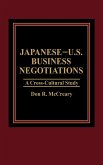Although General Secretary Gorbachev's policy of openness has received much attention and analysis, this is among the first books to evaluate the practical meaning of perestroika for U.S. corporations. Written for executives and managers responsible for international business operations, U.S. Commercial Opportunities in the Soviet Union is a timely and highly readable examination of trade and direct investment prospects in the USSR under the present regime. The authors discuss the major critical variables--such as Soviet systemic barriers and the narrow character of planned Soviet import demand--that should influence any company's decision to do business in the Soviet Union. They explain the mechanics of dealing with the USSR, and offer the information necessary for the reader to decide the potential significance of outward-looking Soviet Union for his or her own firm. Following an introductory overview, the book begins by addressing the micro- and macroeconomic aspects of exporting to Russia. Here the authors identify specific sectors in which American firms can greatly increase their sales to Russia, while warning that certain areas remain essentially closed to U.S. manufacturers. In subsequent chapters the authors explore opportunities for direct investment via joint enterprises with Soviet partners, demonstrating that this form of activity presents greater risks but also greater potential rewards to U.S. firms than trade. The final chapter explores the prospects for U.S. commercial interests in Russia. The authors examine the growth of Soviet external debt in terms of its possible effects on Russia as a competitor of and collaborator with American firms in third country economies. They conclude that should Gorbachev's vision of Russia as a global economic power become a reality, American firms may well face a new, potent source of low-cost competition overseas.
Hinweis: Dieser Artikel kann nur an eine deutsche Lieferadresse ausgeliefert werden.
Hinweis: Dieser Artikel kann nur an eine deutsche Lieferadresse ausgeliefert werden.








